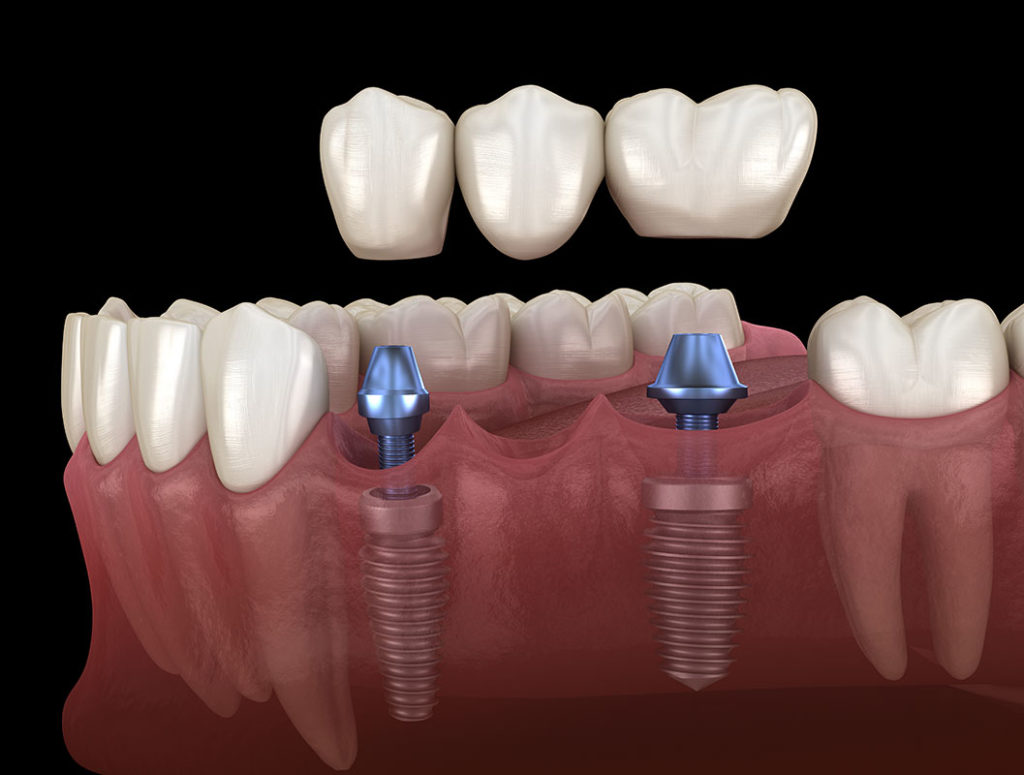Locations
Madhapur Plot No, 172, Rd Number 9, Ayyappa Society, Chanda Naik Nagar, Madhapur, Hyderabad, Telangana - 500072 Gayatri Nagar Plot no 298, beside sbi bank, Gayatri Nagar, Allapur, Borabanda, Hyderabad, Telangana - 500018 Miyapur H.no 1-258, opposite IndusInd bank, miyapur X Road, Miyapur, Hyderabad - 500049 Madhapur H.no: 2-56/23/15/5, ground floor, sainagar,madhapur, Hyderabad - 500081When an individual loses a tooth because of injury or disease, they can experience complications like rapid bone loss, defective speech, or changes to chewing patterns that leads to discomfort. Replacing a lost tooth with a dental implant can improve the quality of patient’s life and overall health.
Dental implant systems comprise of a dental implant body and dental implant abutment and may likewise include an abutment fixation screw. The dental implant body is inserted surgically in the jawbone instead of the tooth's root. The dental implant abutment is usually connected to the implant body by the abutment fixation screw and stretches out through gums into the mouth to support the attached artificial teeth.
Types of Dental Implants
- Endosteal (in the bone): This is the most common type of implant. Its various forms include screws, cylinders or blades surgically into the jawbone. Every implant holds 1 or more prosthetic teeth. This type of implant is an option for patients who are now wearing bridges or removable dentures.
- Subperiosteal (on the bone): This type of implant is put on top of the jaw with metal framework’s posts that distend through the gum to hold the implant in place. Subperiosteal implants are utilized for patients who are unable to wear conventional dentures and don't have sufficient bone height to hold an endosteal implant.
Are you a candidate for Dental Implants?
You are a right candidate for a dental implant if:
- You are in good general and oral health.
- You have sufficient bone in your jaw to help the implant.
- You have healthy gum tissues that are free from periodontal disease.
Dental implants are closely associated with the soft tissues (i.e., gums) and underlying hard tissues (i.e., bone) in the mouth.
Benefits
Dental implants provide various benefits for individuals who have lost one or more teeth or need tooth replacement and they include:


Improved appearance
Dental implants look and feel like natural teeth. They are designed to fuse with the jawbone, giving a permanent and natural-looking solution for missing teeth.
Comfort and convenience
Dental implants become a part of your mouth, removing the discomfort and inconvenience related with removable dentures.
Enhanced speech
Unlike removable dentures that can slip and cause speech difficulties, dental implants allow you to speak with confidence without worrying about any oral appliances shifting.
Better eating ability
With dental implants, you can enjoy a wider range of foods, as they restore full chewing function, similar to natural teeth.
Long-lasting solution
Dental implants can last a lifetime, making them a durable tooth replacement option when maintained properly.
Preserves jawbone and facial structure
Dental implants stimulate the jawbone, preventing bone loss that typically occurs when a tooth is missing. This helps maintain facial structure and prevents the sunken appearance often associated with missing teeth.
No impact on adjacent teeth
Unlike dental bridges, which require the support of neighboring teeth, dental implants stand independently, without affecting adjacent healthy teeth.
Confidence boost
Dental implants can restore your smile and improve your self-confidence, as they look and feel like your own teeth.
Reliable and predictable results
Dental implant procedures have a high success rate when performed by experienced professionals, providing predictable and reliable outcomes.
Oral health improvement
Dental implants do not require the alteration or reduction of neighboring teeth, preserving more of your natural tooth structure. This contributes to better overall oral health.
